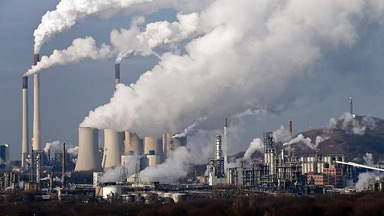Climate change, risk management and the big emitters
Dealing with climate change is fundamentally about risk management,
two lead authors of the Intergovernmental Panel on Climate Change
reports told an audience at the World Bank. It's a threat multiplier
that adds new dimensions and complexity to the development challenges
we're already facing.
Governments are stepping up to the challenge as business leaders,
investors, and civil society urge action on climate change.
 The day the IPCC authors spoke, the US Environmental Protection
Agency released its plan to regulate emissions from power plants with a
goal of cutting greenhouse gas emissions 30 percent by 2030. The day the IPCC authors spoke, the US Environmental Protection
Agency released its plan to regulate emissions from power plants with a
goal of cutting greenhouse gas emissions 30 percent by 2030.
The global landscape for climate action is changing quickly. The
United States unveiled plans to use its Environmental Protection Agency
to limit CO2 emissions from power plants, and an advisor to China's
government said shortly afterward that his country, where six local
carbon markets are now active and stricter pollution rules were recently
approved, was considering national CO2 emissions controls starting as
early as 2016.
These are the two leading greenhouse gas emitters, and they are
stepping up their climate action plans as we move towards a new
international climate agreement in 2015.
The push for effective action on climate change needs to come from
many directions as the science makes clear the risks ahead. The World
Bank Group along with others is calling on governments and businesses to
support putting a price on carbon. Businesses, investors, and civil
society groups have also been publicly calling for climate action.
After the EPA announcement on Monday, more than 170 business leaders
and investors, organised by Ceres, issued a letter of support for the
planned US regulations, calling them "a critical step in moving our
country towards a clean energy economy."
Underlying this growing recognition of the need for policies that
drive the shift to low-carbon, resilient economies is the science,
spelled out in the latest Intergovernmental Panel on Climate Change
reports.
On Monday, as the US EPA released its plans, IPCC lead authors Chris
Field and Ottmar Edenhofer joined a discussion at the World Bank on the
science of climate change and its impact on development. The impacts are
evident in changes in water supplies as glaciers and snow cover
disappear; in agriculture subjected to drought or excessive rain fall;
and even risks of conflict, said Field, the co-chair of the IPCC Working
Group II report on adaptation. It raises the risk to the poor, who have
the fewest resources to adapt, but even the wealthiest societies are
vulnerable to the impact of climate change.
Field talked about climate change in the framework of risk management
- a framework that investors and business leaders are well acquainted
with and which helps them now consider the risks and opportunities
climate change creates for their sectors and businesses.
Climate change is a threat multiplier that adds new dimensions and
complexity to the development challenges we're already facing, Field
said.
"Fundamentally, the challenge of managing climate change is a
challenge of managing and reducing risk. We know plenty, but we need a
transition from the perspective of knowing lots to doing lots," he said.
The IPCC reports describe the dangers posed by climate change, the
trajectory with and without action and mitigation efforts, and the
benefits of action.
The Working Group III report on mitigation, co-chaired by Edenhofer,
discusses the local and social benefits of climate action, such as
improving air quality, reducing health costs, and reducing other social
costs of climate change. It's an issue of the global commons and
inter-generational justice, he said.
There is no single, magic bullet for slowing human-induced climate
change, Edenhofer said. It will take a mix of policies and new
technologies, including several discussed in the IPCC reports, such as
carbon capture and storage technologies that can sequester CO2. It will
also take time, but action can provide short-term benefits in jobs,
health and lowering the social costs of carbon. |

